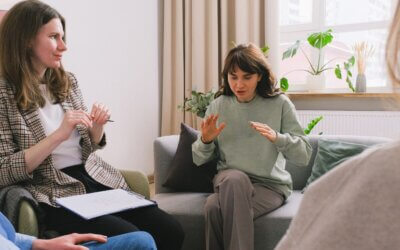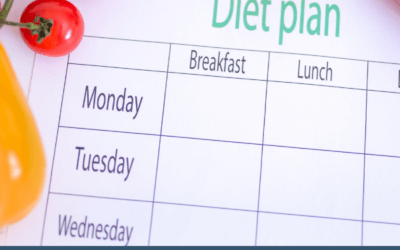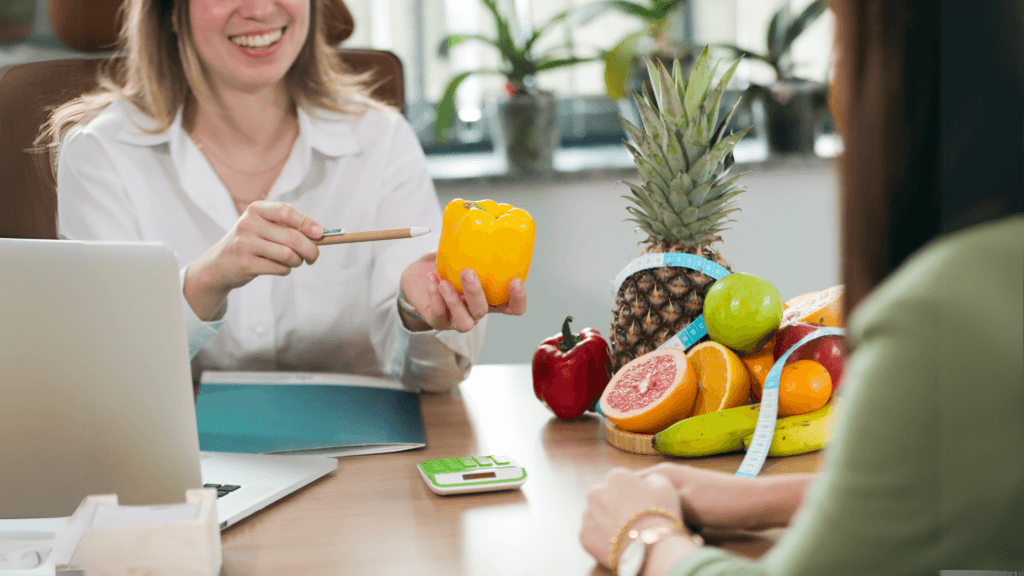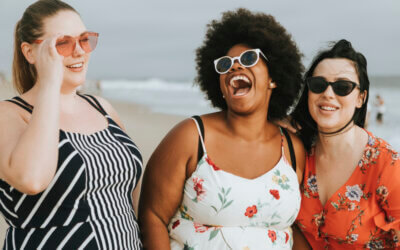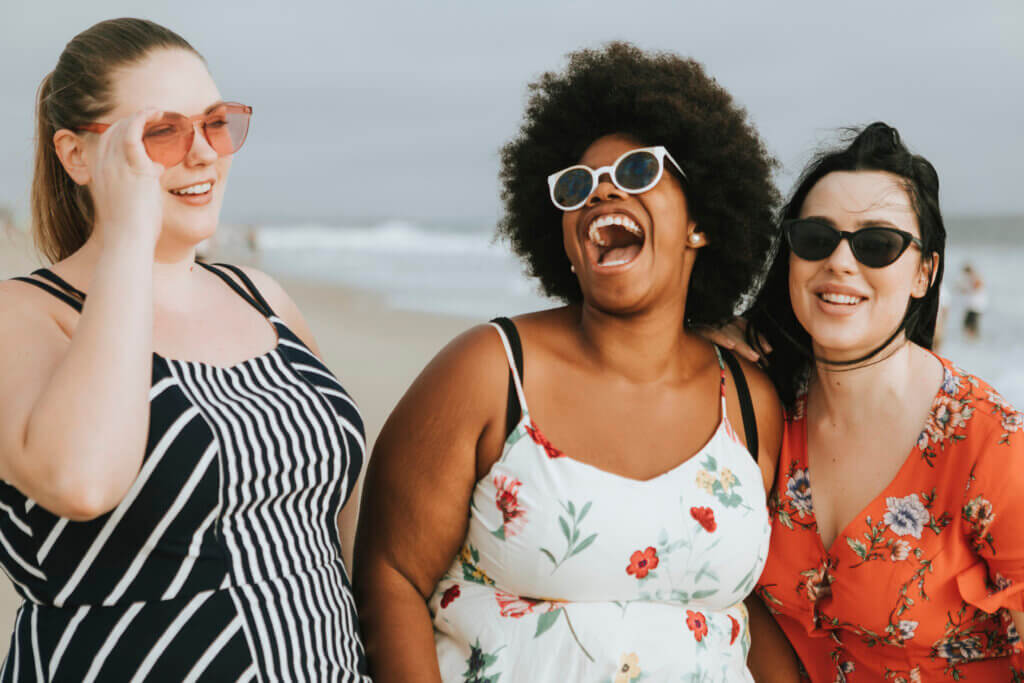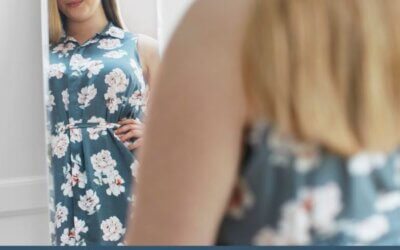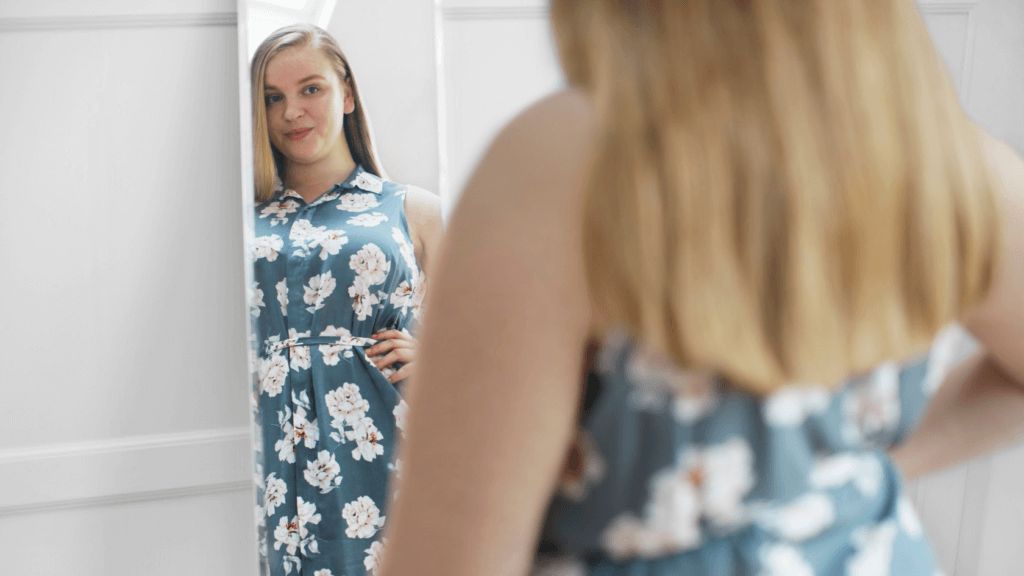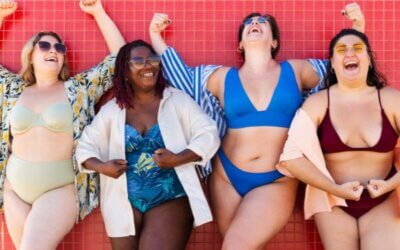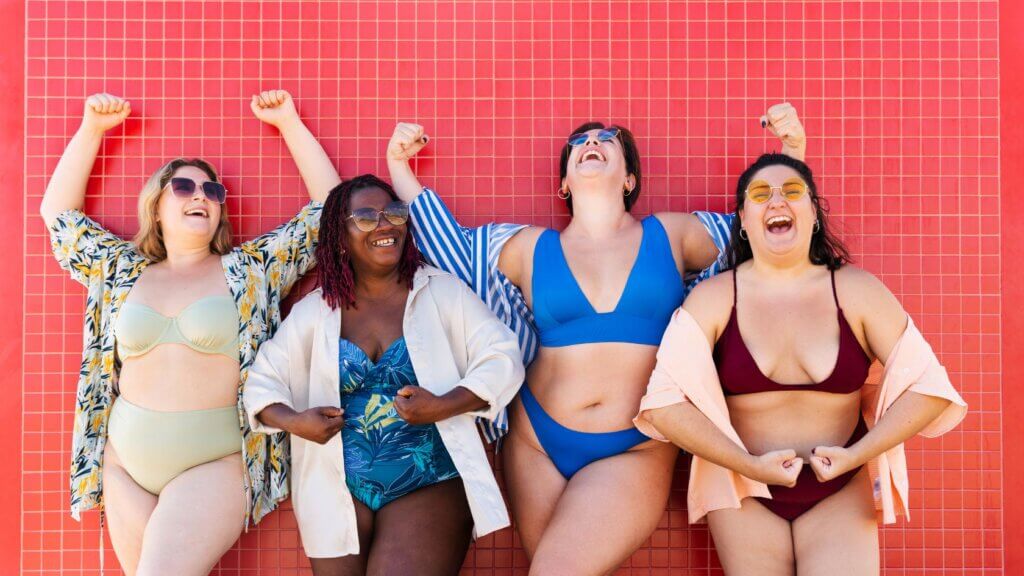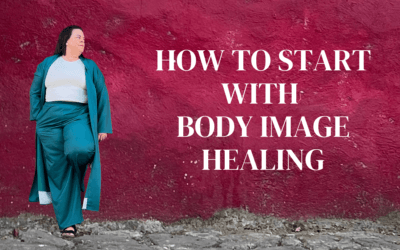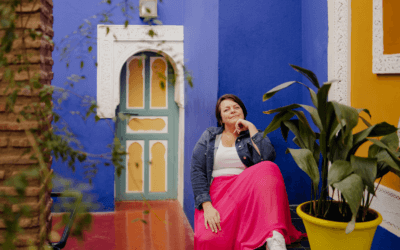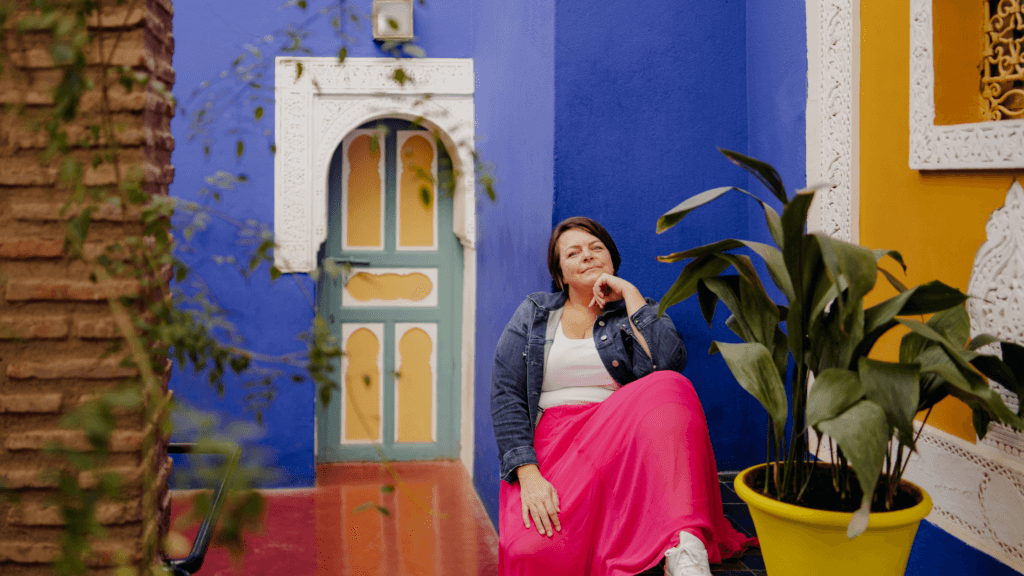Body Image Blogs
Health Coach—Should You Stop Selling Weight Loss?
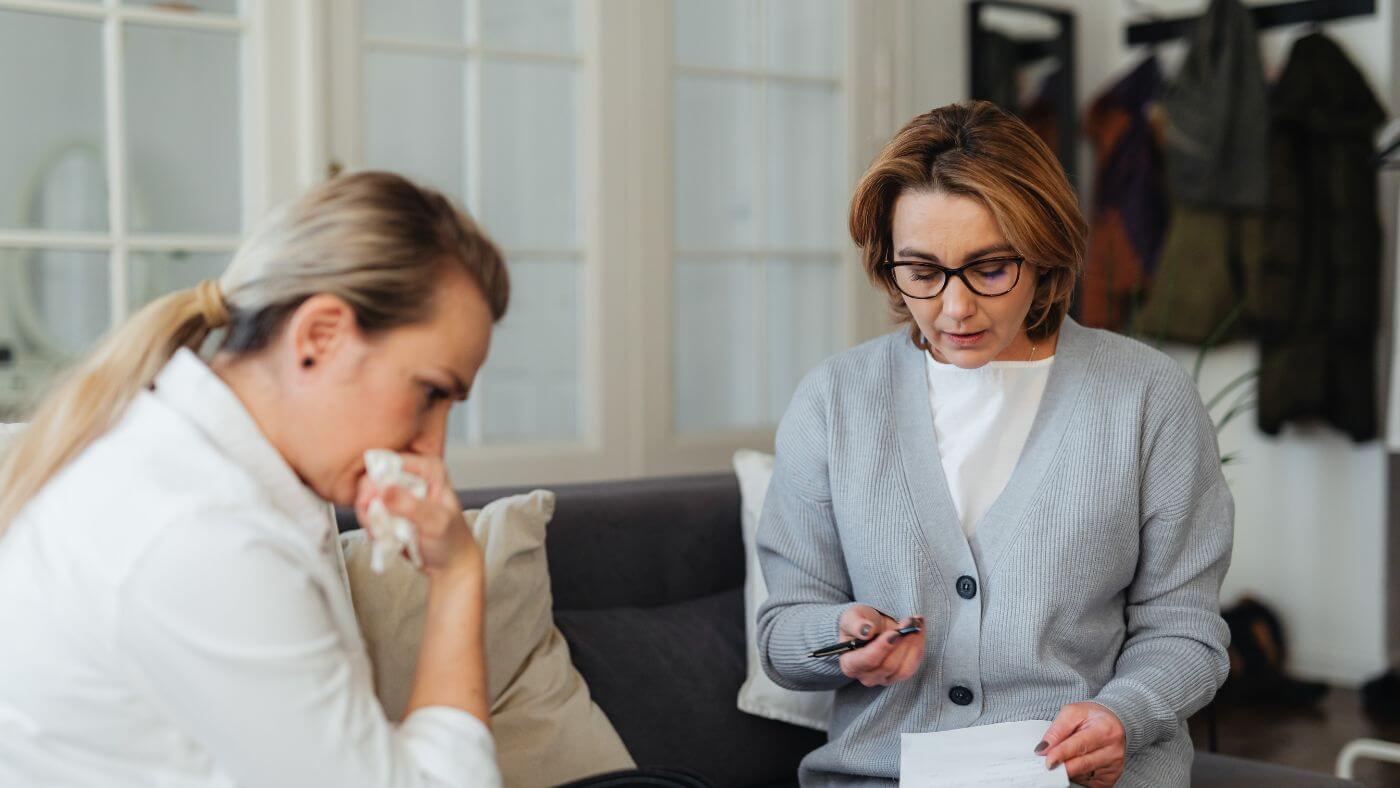
As a health coach, the question of whether to stop selling weight loss is one that touches not just your business but also your values and ethics. For many, weight loss programs seem like a natural fit because “it’s what sells” or “it’s what clients want.” But is selling weight loss really aligned with what you believe in?
This guide is for health coaches considering the transition to non-diet health coaching. We’ll dive into the ethical and emotional challenges of stepping away from weight loss-focused programs, share real conversations from the field, and provide a roadmap for creating a business that’s values-aligned and impactful.
Health Coaching Selling Weight Loss: Why It Feels Safe
Let’s start by acknowledging the reality: in a fatphobic society, weight loss is seen as a desirable outcome. From social media influencers to healthcare professionals, the pervasive message is that shrinking your body equals success, health, and happiness.
As coaches, we’re taught to “sell people what they want and give them what they need.” For many of us, that’s meant marketing weight loss programs to draw clients in, even if we later shift the focus to sustainable, non-diet approaches.
But here’s the thing: this model perpetuates harm.
Every time you market weight loss, you reinforce the narrative that something is wrong with your clients’ bodies. You’re not just selling a program—you’re upholding the oppressive systems of diet culture and fatphobia.
A Conversation That Changed Everything
During a recent body image coaching mentorship, I had a powerful conversation with a client about this very topic:
Client: “I wish I could join the Non-Diet Certification, but you don’t accept people who sell weight loss.”
Me: “Interesting. Why do you sell weight loss?”
Client: “Well, you know, that’s what sells. That’s what women want.”
Me: “Do you believe in the process of dieting and the sustainability of intentional weight loss long term?”
Client: “No, I don’t, and that’s why I give them the Non-Diet approach when they start working with me.”
Me: “I see. May I ask then why you are here learning from me about body image coaching?”
Client: “Well, it’s because my clients really struggle with accepting their bodies. I need to get better at helping them.”
Me: “So let me make sure I understand: you don’t believe in dieting or intentional weight loss. You don’t coach your clients to use dieting tactics. You’re here learning from a fat nutritionist and interested in advancing your skills. The only thing between you and your desires is releasing weight loss as a promise. Why do you think you’re resisting?”
Client: Silence. “I’m afraid of what will happen.”
Health Coaching Selling Weight Loss: The Fear of Letting Go
That fear is real—and valid. We live in a culture that rewards weight loss marketing with clicks, sign-ups, and praise. Moving away from selling weight loss can feel like stepping off a cliff without a safety net.
For many, the fear stems from internalized fatphobia and the belief that clients won’t invest in programs that don’t promise weight loss. This fear often manifests as:
- Worry about losing clients.
- A dip in revenue during the transition.
- Uncertainty about how to market non-diet services.
A Personal Journey: Trusting Your Values
I’ve been there. Eight years ago, I was a nutritionist selling weight loss programs despite not believing in their long-term effectiveness. I felt stuck, scared, and unsure of how to move forward without compromising my integrity.
But I made the leap. I stopped selling weight loss, embraced non-diet health coaching, and built a business rooted in my values. Was it easy? No. Was it worth it? Absolutely.
Here’s what I’ve learned:
- Trusting your intuition and aligning with your values is the foundation for sustainable success.
- Your ideal clients—the ones ready to do meaningful work—will find you.
- Stepping away from weight loss programs allows you to create deeper, more fulfilling client relationships.
What Happens When You Stop Selling Weight Loss
When coaches transition to non-diet health coaching, they often report significant positive shifts in their business and personal fulfillment:
- “I’m calling in my ideal clients who are ready to do the work.”
- “I stopped selling weight loss, and my program packages are selling better.”
- “I’m working with clients who are fun to coach and aligned with my values.”
- “I feel confident and clear in my business decisions.”
Why Non-Diet Coaching Works
Non-diet health coaching isn’t about ignoring health or behaviors—it’s about focusing on sustainable changes that don’t hinge on weight loss. Clients learn to:
- Build healthier relationships with food.
- Explore movement that feels joyful, not punishing.
- Develop self-compassion and body acceptance.
By shifting the focus away from weight loss, you empower clients to make changes rooted in self-care, not shame.
Health Coaching Selling Weight Loss: Practical Steps to Transition to Non-Diet Coaching
If you’re ready to stop selling weight loss, here’s how to begin:
- Clarify Your Values: What do you stand for as a coach? Write down your values and let them guide your decisions.
- Educate Yourself: Learn the principles of non-diet coaching and health at every size (HAES).
- Audit Your Marketing: Remove language that promises weight loss and replace it with messaging about sustainable health and well-being.
- Address Your Fears: Reflect on what’s holding you back and seek support from mentors or peers.
- Lean into Community: Surround yourself with other non-diet professionals who can offer guidance and encouragement.
Health Coaching Selling Weight Loss: Is It Time to Stop Selling Weight Loss?
Ultimately, the decision to stop selling weight loss is deeply personal. It requires courage, reflection, and a willingness to disrupt the status quo. But the rewards—both for your clients and your business—are profound.
By letting go of weight loss as a promise, you free yourself to build a coaching practice that aligns with your values and supports lasting change.
Are you ready to make the leap?
Need Help Transitioning to Non-Diet Health Coaching?
You can access all of our services on our work with us page. We have a number of programs and service levels enabling us to serve most women:
Free Resources and Masterclasses: Get started and get to know us better!
Private coaching with Stephanie and her team Stephanie and her team of Certified Non-Diet Coaches are waiting to support you in a one-to-one setting with an individualized plan.
Non-Diet Coaching Certification for professionals ready to integrate the Going Beyond The Food Method™️ in their practice and for women wanting to become Certified Coach and build a business coaching other women beyond the food.
We Need Thin Weight Neutral Health Coaches and Providers
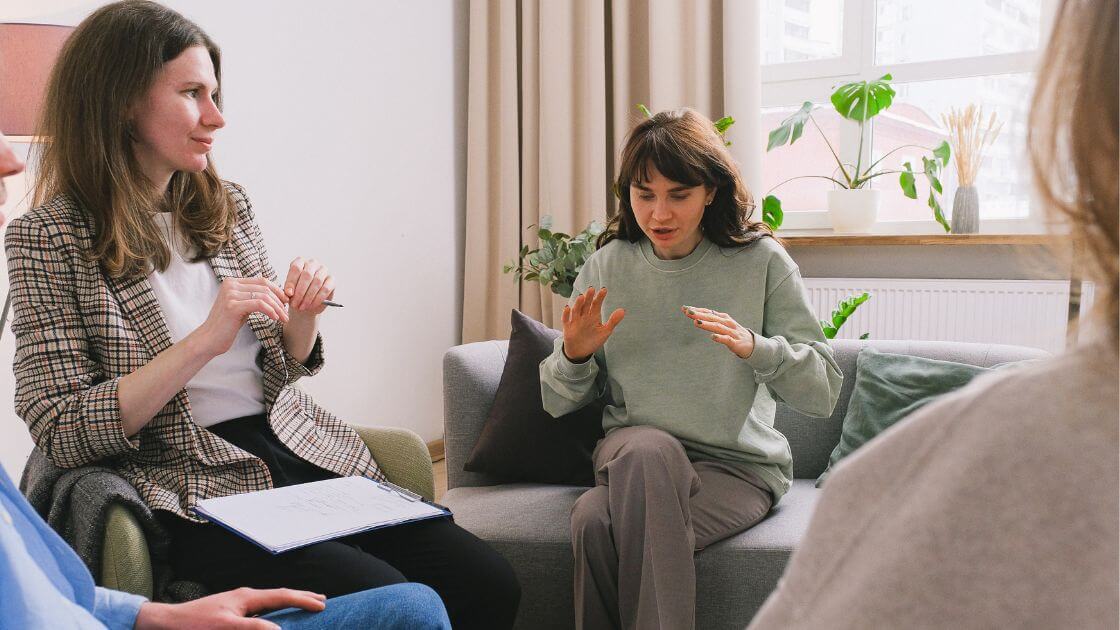
The weight-neutral health coaching space is a movement that’s transforming how we approach health and well-being. At its core, this philosophy embraces health at every size, rejecting the traditional focus on weight loss as a measure of success.
While the space has grown significantly, an important conversation remains: the role of thin weight-neutral health coaches and providers. This essay explores why we need people of all body sizes in this space, especially thin providers, and how they can use their position to create meaningful change.
What Does It Mean to Be a Weight-Neutral Health Coach?
Weight-neutral health coaches prioritize behaviors over outcomes. Instead of promoting weight loss, they focus on sustainable habits like intuitive eating, joyful movement, and stress management. This approach helps clients improve their health and relationship with their bodies without fixating on the scale.
For weight-neutral coaching to truly thrive, it requires diversity among its providers. That means welcoming coaches of all body sizes—thin, fat, and everything in between.
Why Thin Coaches Are Vital to the Weight-Neutral Space
There’s a misconception circulating that thin coaches don’t belong in weight-neutral spaces because they benefit from thin privilege. However, this perspective oversimplifies the impact thin coaches can have.
1. Representation Matters: Clients entering the weight-neutral space for the first time may feel more comfortable with a thin coach, especially if they have internalized fatphobia. For some, seeing someone they perceive as “acceptable” can create a bridge to understanding.
2. Leveraging Privilege for Good: Thin coaches have a unique ability to acknowledge and challenge the privileges they benefit from, creating safer spaces for clients in larger bodies.
3. Expanding the Movement: The inclusion of thin coaches helps normalize the idea that weight-neutral approaches are for everyone, not just people in larger bodies.
Rather watch the video version of this blog post? We’ve got you…
I recorded a podcast episode a few years back where we discuss thin privilege in health coaching with Alissa Rumsey and Julie Duffy Dillon.
Understanding Thin Privilege in Weight-Neutral Coaching
Thin privilege is the societal advantage people in smaller bodies have simply because they fit the cultural ideal. It shows up in ways like:
- Being accommodated in public spaces.
- Having access to clothing that fits.
- Not facing discrimination from healthcare providers.
In weight-neutral health coaching, thin privilege can impact the client relationship. To foster trust, it’s essential for thin coaches to acknowledge and address this dynamic openly. Doing so creates an environment where clients in larger bodies feel seen and respected.
My Personal Journey with Thin Coaches
Nine years ago, as I began recovering from diet culture, I was hesitant to work with a fat coach. My internalized fatphobia was so strong that I couldn’t face my own body reflected back to me during coaching sessions.
Instead, I found my first weight-neutral health coach in a thin-bodied woman. She had never struggled with body image the way I had, but she held a safe space for me when I couldn’t do that for myself. She taught me to process emotions, practice self-compassion, and confront my internalized fatphobia.
That coach was the catalyst I needed to eventually work with someone in a larger body. Without her, I wouldn’t have been ready to take the next step in my journey.
How Thin Weight-Neutral Coaches Can Support Clients of All Sizes
If you’re a thin coach or provider entering the weight-neutral space, here are actionable steps to ensure you’re creating inclusive, empowering spaces for your clients:
1. Acknowledge Your Privilege: Be transparent about the advantages you’ve experienced in your body. Naming this privilege helps build trust.
2. Hold Safe Space: Learn how to create an environment where clients feel supported and validated, regardless of their size.
3. Educate Yourself: Understand the unique challenges faced by people in larger bodies, including systemic fatphobia and weight stigma.
4. Use Your Voice: Advocate for body diversity and weight-neutral approaches in professional spaces and on public platforms.
5. Practice Self-Compassion: If you feel guilt about your privilege, channel it into positive action instead of self-criticism.
Training Weight Neutral Coaches: The Skills That Matter
To be an effective weight-neutral health coach, whether thin or fat, you need more than good intentions—you need skills. Some essential coaching skills include:
- Understanding Belief Systems: Helping clients uncover and change harmful thoughts about their bodies.
- Nervous System Regulation: Teaching clients how to manage stress and emotions in a way that supports long-term health.
- Creating Safe Spaces: Building environments where all clients feel respected and empowered.
- Intersectional Coaching: Recognizing how factors like race, gender, and socioeconomic status intersect with body size and health.
The journey to becoming a skilled weight-neutral coach begins with doing the work on yourself first. By examining your own biases, beliefs, and behaviors, you can show up authentically for your clients.
Why Diversity Strengthens the Weight-Neutral Movement
Diversity in coaching bodies isn’t just a bonus—it’s a necessity. Having coaches of different sizes, experiences, and backgrounds enriches the movement and ensures it meets the needs of all clients.
Thin weight-neutral coaches bring the ability to bridge gaps for clients who might not be ready to confront internalized fatphobia. Fat coaches offer lived experience and insights that thin coaches simply can’t replicate. Together, they create a more inclusive, powerful movement.
Weight Neutral Health Coaches: A Call to Action
If you’re a thin coach considering entering the weight-neutral space, know this: your presence matters. You have the potential to make a profound impact on your clients’ lives by challenging diet culture and promoting true health.
Likewise, if you’re a client seeking a weight-neutral coach, remember that the right coach for you might not look the way you expect. What matters most is their ability to create a safe, supportive space for your journey.
The weight-neutral health coaching movement needs all of us—thin, fat, and everything in between. Together, we can challenge societal norms, reject diet culture, and create a world where health is accessible to everyone, regardless of body size.
How We Can Help You Become a Weight-Neutral Coach
You can access all of our services on our work with us page. We have a number of programs and service levels enabling us to serve most women:
Free Resources and Masterclasses: Get started and get to know us better!
Private coaching with Stephanie and her team Stephanie and her team of Certified Non-Diet Coaches are waiting to support you in a one-to-one setting with an individualized plan.
Non-Diet Coaching Certification for professionals ready to integrate the Going Beyond The Food Method™️ in their practice and for women wanting to become Certified Coach and build a business coaching other women beyond the food.
Thinking About Going Back on a Diet to Lose Weight? Read This!
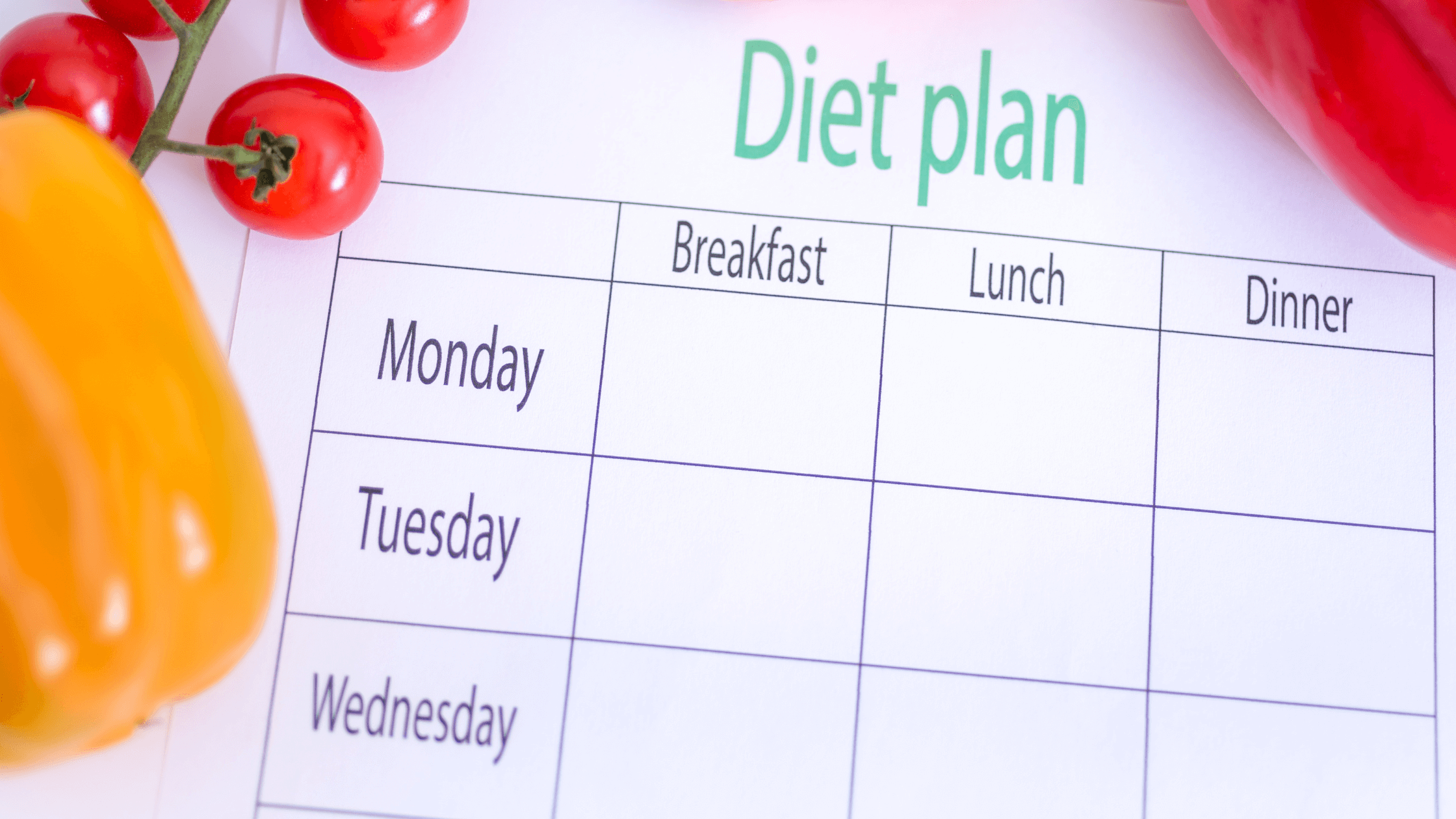
A Guide for Women Triggered by Diet Culture
This guide is for every woman who’s felt triggered by diet culture recently and are thinking about going back on a diet:
- The influencer flaunting their “healthy lifestyle transformation.”
- The gym windows showcasing “before and after” photos.
- Aunt Janice bragging about her miracle weight loss program.
If you’ve caught yourself thinking about going back on a diet, know this: your thoughts are valid and expected. You’re not broken or weak. You’re simply living in a world that constantly reinforces the idea that your body needs to change.
Let’s unpack these triggers together, so you can move past the noise of diet culture and reclaim your power.
Thinking about Going Back on a Diet: How To Coach Yourself When Triggered by Diet Culture
When you think about dieting, it’s often your brain’s way of seeking safety in a fatphobic society. The messaging around us equates thinness with happiness, success, and health. It’s no wonder you feel compelled to change your body—it’s what you’ve been taught for years.
But here’s the truth: a thought is not a fact.
That fleeting desire to lose weight? It’s not an absolute truth about your worth or what you need to feel fulfilled. It just reflects the conditioning you’ve absorbed from diet culture.
Step 1: Normalize Your Thoughts
The first step in navigating these feelings is normalization. Remind yourself that it’s normal to think about dieting in a world obsessed with thinness.
Try saying this to yourself:
“It makes total sense that I feel this way. I live in a fatphobic, diet-culture-obsessed society.”
Place your hand on your heart, breathe deeply, and repeat it with compassion. This simple act can help shift your mindset from self-blame to understanding.
Step 2: Challenge Your Beliefs
After normalizing your thoughts, ask yourself:
- What do I want to believe about my body, health, and happiness?
- Do I want to keep believing that weight loss is the key to my happiness or health?
Diet culture thrives on three major lies:
- Smaller bodies are better and more valuable.
- Health is only accessible at a smaller weight.
- Your worth depends on how hard you work to shrink your body.
Now, let’s rewrite the narrative. Consider these alternative beliefs:
- My body is a tool to experience life, not a sign of my worth as a woman.
- Health-promoting behaviors are accessible at any weight.
- My happiness comes from the way I think about myself, not my pant size.
Step 3: Choose Empowering Thoughts
Once you’ve identified the beliefs you want to hold, it’s time to train your brain to think them more often. This is where true transformation begins, but it requires practice and patience.
Here’s how:
- Write down your new beliefs.
- Place them somewhere visible—on your mirror, fridge, or phone wallpaper.
- Repeat them daily, even if they don’t feel true right away.
Over time, these new thoughts will become second nature, replacing the diet culture beliefs that once dominated your mind.
Why Going Back on a Diet Feels So Tempting
Dieting provides a sense of control, especially when life feels overwhelming. It offers a clear path with rules and promises of a better future. But here’s what diet culture doesn’t tell you:
- Diets fail 91-95% of the time.
- They create a cycle of weight loss and regain, leaving you feeling like the problem when the real issue is the unsustainable methods.
- Dieting harms your relationship with food, your body, and your mental health.
You’re not the problem. Diet culture is.
Step 4: Reflect on What You’re Truly Seeking
When you think about dieting, it’s rarely just about the weight. Ask yourself:
- What am I hoping to feel by losing weight?
- Do I want confidence, happiness, ease, or acceptance?
The good news? You don’t need to shrink your body to feel those things. Confidence and happiness are already within reach—you just need to shift the focus from external validation to internal growth.
Step 5: Break Free with Self-Compassion
Breaking free from diet culture is not a one-time decision. It’s an ongoing process of self-coaching and self-compassion. Here’s how to stay grounded when triggers arise:
- Acknowledge Your Triggers: Recognize when a comment, ad, or thought activates your desire to diet.
- Pause and Breathe: Create space between the trigger and your response.
- Respond with Kindness: Remind yourself that it’s normal to feel this way, but you have the power to choose a different path.
Thinking about Going Back on a Diet: What to Do Instead
Instead of focusing on weight loss, channel your energy into behaviors that genuinely improve your well-being.
1. Focus on Nourishment: Eat foods that satisfy and energize you, without labeling them as “good” or “bad.”
2. Move for Joy: Find activities that make you feel alive and connected to your body, rather than punishing workouts.
3. Prioritize Rest and Stress Management: Sleep and stress reduction are critical for physical and emotional health.
4. Celebrate Your Body: Practice gratitude for what your body allows you to do, rather than how it looks.
Remember: You Are Enough
When you feel the urge to go back on a diet, remind yourself:
- You don’t need to fix yourself.
- Your body is not a problem.
- Diet culture doesn’t get to define your worth.
Choosing to reject dieting is a radical act of self-love in a world that profits from your self-doubt. By reclaiming your thoughts, beliefs, and behaviors, you can liberate yourself from the endless cycle of dieting and finally live fully.
How We Can Help
You can access all of our services on our work with us page. We have a number of programs and service levels enabling us to serve most women:
Free Resources and Masterclasses: Get started and get to know us better!
Private coaching with Stephanie and her team Stephanie and her team of Certified Non-Diet Coaches are waiting to support you in a one-to-one setting with an individualized plan.
Non-Diet Coaching Certification for professionals ready to integrate the Going Beyond The Food Method™️ in their practice and for women wanting to become Certified Coach and build a business coaching other women beyond the food.
Navigating Diet Talks and Comments about Weight & Body
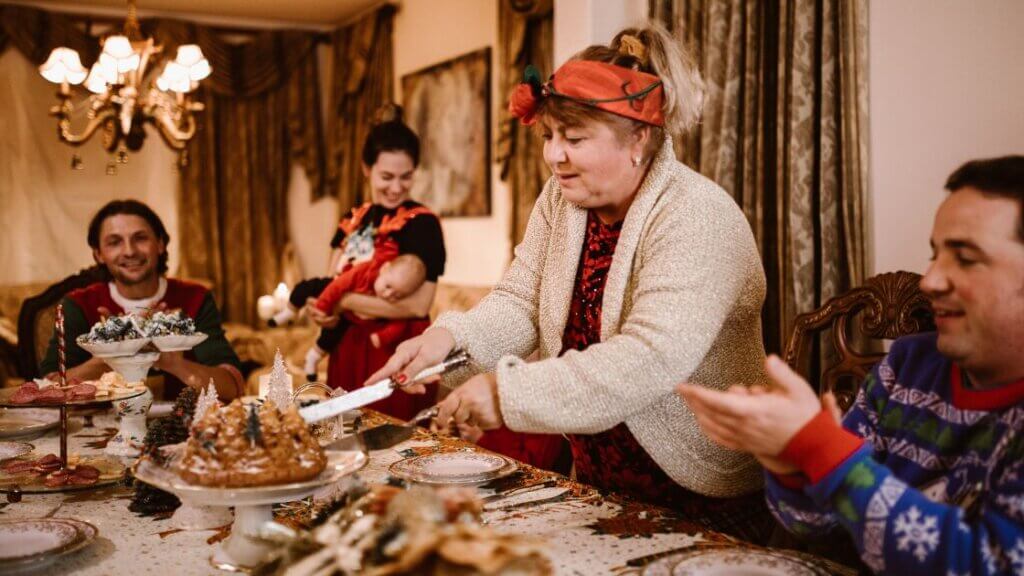
A Guide for Women
In a world preoccupied with appearance and weight, navigating diet culture and unsolicited body commentary can be challenging. Many women face these conversations in social, family, and professional settings, making it essential to develop strategies to maintain self-confidence and emotional well-being. This guide offers insights into understanding diet culture, managing emotional triggers, and setting boundaries to foster empowerment.
Understanding the Context of Diet Talks and Body Comments
The Pervasiveness of Diet Culture
Diet culture is a societal framework that equates thinness with health, morality, and success. This narrative often influences conversations about weight, food, and bodies, leaving many unaware of its insidious effects. Women, particularly, are often targeted, expected to conform to unrealistic body standards shaped by patriarchal norms.
Recognizing the systemic nature of diet culture can help shift perspectives. The comments you hear or the comparisons you make are products of a deeply ingrained belief system, not personal truths.
Rather listen to the audio version of this blog? We’ve got you…
Preparing for Diet and Body Discussions
Anticipate the Conversations
Diet-related discussions tend to surface during holidays, family gatherings, and even casual meet-ups. Rather than being caught off guard, anticipate these topics and prepare mentally. Understand that people may not have the same awareness of diet culture as you do, and many speak from a place of conformity rather than intent to harm.
Mindset Shift: View these interactions as predictable events rather than personal attacks. This reframing can lessen their emotional impact.
Managing Emotional Reactions to Body Comments
Recognizing the Source of Your Emotions
Emotional responses to body-related comments often stem from internalized beliefs rather than the words themselves. For instance, a remark about weight gain might trigger self-doubt because it aligns with existing insecurities. However, these emotions are self-generated by how we interpret others’ words.
Actionable Step: Pause when faced with triggering comments. Ask yourself, “What belief am I holding onto that makes this comment hurtful?” This reflection redirects focus to your own empowerment.
Cultivating Compassion for Yourself and Others
For Yourself
Acknowledge that reacting emotionally to body commentary is a conditioned response shaped by years of exposure to diet culture. Practice self-compassion by reminding yourself that these feelings are normal but can be reprogrammed over time.
intentional Thought: “I am more than my body. My worth is not defined by societal standards.”
For Others
Understand that those engaging in diet talk or commenting on bodies often operate from their own insecurities and limited understanding. Extend compassion, knowing they might not yet realize the harm of their words.
Establishing and Maintaining Boundaries
Internal Boundaries
Internal boundaries involve controlling your reactions and emotions. When encountering diet talk, remind yourself that these opinions are not reflections of your value. Mentally disengage from conversations that don’t align with your beliefs.
External Boundaries
External boundaries require clear communication. Examples include:
- “I prefer not to discuss my body or weight.”
- “Let’s talk about something other than dieting or weight loss.”
- “I am focusing on a healthy relationship with food, and diet culture doesn’t align with that.”
If a conversation continues to infringe upon your comfort, physically remove yourself from the situation when possible.
Reprogramming Internal Beliefs for Long-Term Resilience
The Role of Self-Coaching
Self-coaching is a powerful tool to reshape the beliefs ingrained by diet culture. Start by identifying thoughts that no longer serve you. For example:
- Replace “I need to lose weight to be healthy” with “Health is about habits, not size.”
- Replace “She looks better than me” with “We all have unique bodies that serve us differently.”
Practicing these shifts regularly can rewire thought patterns, reducing the impact of external comments.
Practical Steps for Everyday Situations
- Create Intentional Thoughts: Before attending gatherings, prepare affirming thoughts. For instance:
- “Comments about my body reflect their beliefs, not my worth.”
- “My body is not a topic of public discussion.”
- Develop a Go-To Response: Having a polite yet firm reply ready can defuse awkward moments. For example:
- “Thank you for your concern, but I’m focusing on a holistic approach to my health.”
- Engage in Supportive Communities: Surround yourself with people who respect and celebrate bodies of all shapes and sizes. Online groups or in-person communities can offer encouragement and validation.
The Power of Compassionate Boundaries
Setting boundaries isn’t about controlling others; it’s about protecting your energy and emotional well-being. While some may find this assertiveness surprising, over time, it fosters healthier relationships where mutual respect is prioritized.
Remember: Setting boundaries is a form of self-respect and empowerment.
Final Thoughts: Taking Responsibility for Your Journey
Ultimately, the power to navigate diet talks and body comments lies within. You cannot change others, but you can control how you respond. By shifting your beliefs, preparing for interactions, and setting compassionate boundaries, you reclaim your narrative and define your worth independently of societal standards.
As you embark on this journey, be patient and kind to yourself. Transforming your mindset takes time, but the freedom it brings is invaluable. You are more than your body. Embrace the full, authentic version of yourself.
Ready to Explore this Further?
You can access all of our services on our work with us page. We have a number of programs and service levels enabling us to serve most women:
Free Resources and Masterclasses: Get started and get to know us better!
Private coaching with Stephanie and her team Stephanie and her team of Certified Non-Diet Coaches are waiting to support you in a one-to-one setting with an individualized plan.
Non-Diet Coaching Certification for professionals ready to integrate the Going Beyond The Food Method™️ in their practice and for women wanting to become Certified Coach and build a business coaching other women beyond the food.
Healthism: The Desire to Be Healthy Gone Wrong
Healthism: A Guide for Women
Health is undeniably important for overall well-being, but when the pursuit of health takes on an obsessive, moral, or judgmental tone, it can transform into something more harmful than helpful—this is what we call healthism. Especially for women, the pressure to embody an ideal of perfect health often becomes entangled with societal expectations, personal worth, and even consumer culture. This guide aims to unpack healthism, its impact, and how to recognize when your desire to be healthy has crossed a line.
What is Healthism?
Healthism is a belief system that places disproportionate value on individual health and views it as the ultimate measure of personal worth. In essence, it equates being healthy with being virtuous. Much like diet culture, which idealizes thinness, healthism idealizes optimal health and often disregards the societal, environmental, and genetic factors that influence it.
Key tenets of healthism include:
- Health is entirely within individual control.
- Health is a moral obligation.
- Those who are healthy are perceived as superior to those who are not.
While prioritizing health seems positive on the surface, the ideology of healthism ignores the nuances of health, such as its natural fluctuations and the myriad external influences that are beyond personal control. For women, this is compounded by societal pressures to “do it all”—to be the ideal partner, parent, and professional while also being flawlessly healthy.
How Healthism Manifests in Women’s Lives
The societal push for women to prioritize health often begins with subtle messaging, such as:
- Ads promoting “clean eating” or “wellness routines.”
- Social media influencers showcasing unattainable standards of health.
- Advice framing health behaviors as moral choices (e.g., “good” vs. “bad” foods).
Over time, these messages can lead to unhealthy behaviors disguised as wellness, including:
- Over-reliance on supplements or detoxes: Women may feel compelled to spend exorbitantly on wellness products that promise perfection.
- Perfectionism in diet and exercise: Strict regimens with no room for flexibility can result in burnout or disordered eating patterns.
- Judging self-worth by health status: Women may feel inadequate or guilty for experiencing normal health fluctuations like menopause or illness.
For example, a woman going through menopause might believe her symptoms signify a failure to prepare her body adequately. This not only stigmatizes natural health transitions but also fosters feelings of guilt and inadequacy.
Rather listen the audio version of this blog? We’ve got you…
We also have a version of this podcast for health professional
The Link Between Healthism and Self-Worth
One of the most damaging aspects of healthism is how it ties health to self-worth. Many women internalize the belief that they must be healthy to be valuable. This can manifest as:
1. Internalized Shame: Feeling “less than” because of perceived health shortcomings.
2. Constant Anxiety: Obsessing over health choices and fearing judgment from others.
3. Never-Ending Pursuit: Chasing an ideal of health that is both unrealistic and ever-changing.
This fixation often leads to a cycle of striving and failure. When health is positioned as a moral responsibility, any deviation can feel like a personal shortcoming, triggering a fight-or-flight response to “regain” worth.
Recognizing Problematic Patterns in Your Health Journey
How can you tell if your pursuit of health has become problematic? Reflect on the following questions:
1. Do you feel guilty when you deviate from your health routine?
2. Are you spending excessive time or money chasing health ideals?
3. Do you tie your self-worth to your ability to follow strict health rules?
4. Are you ignoring external factors (like genetics, stress, or life circumstances) in your assessment of your health?
5. Do you delay happiness or self-acceptance until you achieve “perfect health”?
If you find yourself answering “yes” to many of these questions, it may be time to reassess your relationship with health.
Shifting Perspectives: A Balanced Approach to Health
Recognizing and addressing healthism requires a shift in mindset. Here are some steps to cultivate a healthier relationship with health:
1. Acknowledge Health as a Spectrum
Health is not binary—it is not something you either “have” or “lack.” It is a dynamic and multifaceted aspect of life that fluctuates due to factors both within and beyond your control.
2. Separate Health from Self-Worth
Your worth as a person is not determined by your health status. Practice self-compassion and recognize that being human involves imperfections, including health challenges.
3. Reclaim Autonomy in Health Choices
Shift from “I have to” to “I choose to.” Decide which health practices genuinely enhance your life rather than adhering to rigid rules imposed by societal pressures.
4. Challenge the Narrative of Personal Responsibility
Understand that you control only a small portion of the factors influencing your health. Research shows that external determinants like socioeconomic status, environment, and genetics play a far more significant role than individual choices.
5. Focus on Enjoyment, Not Obligation
Instead of forcing yourself into a strict health regime, explore activities and foods you genuinely enjoy. This reframes health as a source of pleasure rather than pressure.
Moving Forward: The Bright Side of Wanting to Be Healthy
When approached from a place of self-love rather than fear or obligation, the pursuit of health can be empowering. By redefining health as a personal, flexible, and nonjudgmental practice, women can liberate themselves from the oppressive grip of healthism.
Imagine exercising not because you feel you must, but because your body craves movement. Or choosing foods based on satisfaction and nourishment rather than societal labels of “good” or “bad.” This shift fosters a sense of autonomy and well-being without the weight of perfectionism.
Final Thoughts: Liberating Yourself from Healthism
Healthism may present itself as a pursuit of wellness, but its darker side often brings stress, guilt, and dissatisfaction. For women, disentangling self-worth from health is not just a personal journey but also an act of defiance against societal norms that impose unattainable standards.
By recognizing the signs of healthism and adopting a balanced approach to health, you can reclaim your time, energy, and joy. Remember, your value is not determined by your health status—you are inherently worthy, just as you are.
Want to learn more about redefining health and cultivating self-compassion?
You can access all of our services on our work with us page. We have a number of programs and service levels enabling us to serve most women:
Free Resources and Masterclasses: Get started and get to know us better!
Private coaching with Stephanie and her team Stephanie and her team of Certified Non-Diet Coaches are waiting to support you in a one-to-one setting with an individualized plan.
Non-Diet Coaching Certification for professionals ready to integrate the Going Beyond The Food Method™️ in their practice and for women wanting to become Certified Coach and build a business coaching other women beyond the food.
How to Love Yourself in Your Now Body
How to Love Yourself in Your Now Body
Have you ever felt like you’re waiting to reach some imaginary finish line before you can finally start loving yourself? For 25 years, I lived in that perpetual waiting room, believing that self-love was something I needed to earn. Today, I want to share my journey of learning how to love yourself exactly as you are, in your now body – no conditions attached.
Why Loving Yourself Feels So Hard Right Now
Let’s be honest – if you’ve spent years thinking your body isn’t “enough,” the idea of loving yourself probably feels like a stretch. I get it because I’ve been there. Through years of socialization, we’ve unknowingly become experts at criticizing ourselves, building an impressive skillset of finding reasons why we’re not worthy of self-love… yet.
Sound familiar?
– “I’ll love myself when I take better care of my body”
– “Once I fix this one thing, then I’ll be worthy”
– “If I could just change X, Y, or Z, self-love would come naturally”
Here’s the truth I wish someone had told me sooner: If you keep believing you have to change before you can love yourself, you’ll be stuck in that cycle forever. I know because I spent over 25 years trapped in that exact pattern.
My Personal Journey to Self-Love
Looking back, I can pinpoint exactly how this cycle manifested in my life. Every Monday, I’d start a new diet, convinced that this time would be different. I’d meticulously track every calorie, schedule every workout, and promise myself that once I reached my “goal weight,” I’d finally feel worthy of love.
But here’s what actually happened: Even when I did reach those arbitrary goals, the self-love I desperately sought remained elusive. I’d find new flaws to fix, new measurements to obsess over, and new reasons why I wasn’t “quite there yet.”
The turning point came during a particularly exhausting cycle of restriction and self-criticism. I realized I’d spent more time hating my body than I had loving any other aspect of my life. That thought stopped me cold. How many precious moments had I missed because I was too busy planning my next transformation?
The Mindset Shift That Changed Everything
In my forties, exhaustion finally caught up with me. I was tired of trying to earn my way to self-love through “perfect” behavior. That’s when a coach asked me something that changed everything: “What if you took the risk to love yourself right now? Unconditional to your behaviors?”
This question stopped me in my tracks. I realized I had been trying to hustle my way to self-love, believing that:
– More “right” behaviors would earn me self-love
– Less “wrong” behaviors would make me worthy
– Self-love was something to achieve rather than choose
How to Start Loving Yourself in Your Now Body Today
The journey to self-love isn’t about changing your body – it’s about changing your mind. Here’s how to begin:
1. Make the Decision
Love, like any other feeling, is created by the thoughts we think, not the actions we take. You must actively decide to love yourself. This means consciously choosing to think thoughts that create feelings of love, even (and especially) when it feels uncomfortable.
2. Authorize Yourself
Stop waiting for permission. You need to self-authorize to think loving thoughts about yourself because that authorization won’t come from anyone else. You have the power to grant yourself this permission right now.
3. Embrace Discomfort
Learning to love yourself will feel uncomfortable at first. My inability to sit with this discomfort kept me in diet culture for decades. Being comfortable with discomfort is a crucial part of the journey.
What the Transformation Really Looks Like
The path to self-love isn’t linear – it’s more like a spiral staircase. Here’s what you can expect along the way:
The Early Days
In the beginning, you’ll catch yourself falling into old patterns of self-criticism. That’s normal. The difference is that now you’ll recognize these thoughts for what they are: learned behaviors, not truths. Each time you notice these thoughts, you have a new opportunity to choose differently.
The Middle Ground
As you practice self-love, you’ll start having more good days than bad. You might still struggle, but you’ll recover faster. I remember the first time I looked in the mirror and my first thought wasn’t about what needed to be “fixed” – it was a moment of genuine appreciation for my body’s strength and resilience.
The New Normal
Eventually, self-love becomes your default setting. For me, this means:
– Starting each day with acceptance rather than criticism
– Treating myself with the same compassion I offer others
– Seeing setbacks as opportunities for growth rather than proof of unworthiness
– Choosing clothes that feel good now, not waiting for some future version of myself
What Self-Love Looks Like Now
Today, loving myself is my default state of being. It’s not something I earn – it’s something I choose, regardless of what I do or don’t do. When I notice myself steering away from self-love, I see it as a signal to pause and reevaluate my thoughts, not my body.
Remember: You must love yourself to the future you want. Waiting until you’ve changed to start loving yourself is like waiting until you’ve reached your destination to put gas in your car – it just doesn’t work.
The path to loving yourself in your now body starts with a single decision – the decision to stop waiting and start loving yourself today. Are you ready to make that choice?
Ready to Transform Your Relationship with Self-Love?
You can access all of our services on our work with us page. We have a number of programs and service levels enabling us to serve most women:
Free Resources and Masterclasses: Get started and get to know us better!
Private coaching with Stephanie and her team Stephanie and her team of Certified Non-Diet Coaches are waiting to support you in a one-to-one setting with an individualized plan.
Non-Diet Coaching Certification for professionals ready to integrate the Going Beyond The Food Method™️ in their practice and for women wanting to become Certified Coach and build a business coaching other women beyond the food.
The #1 Body Image Coaching Question
As a body image coach, I’ve discovered a powerful question that can completely transform how women perceive and relate to their bodies. This simple yet profound inquiry has the potential to kickstart a journey of self-discovery and healing. So, what is this game-changing body image coaching question? Let’s dive in and explore its impact.
The #1 Body Image Coaching Question: “Why Do You Have a Body?“
This question often leaves my clients speechless. It’s not something most women have ever considered before, and that’s precisely why it’s so powerful. When I pose this question in my body image course, I allow the silence to linger, giving my clients the space to reflect deeply.
The Power of Reflection
The most common response I hear from my body image clients is, “I’ve never thought about that before.” And that’s exactly the point. This body image coaching question opens up a world of possibilities and new perspectives. It challenges the deeply ingrained beliefs we’ve absorbed from society about our bodies’ purpose and value.
Unpacking Socialization and Belief Systems
By pondering why we have a body, we begin to unravel the complex web of socialization and belief systems that have shaped our body image. This question allows my coaching clients to:
1. Examine our unconscious beliefs about our bodies
2. Identify the sources of these beliefs (media, family, culture)
3. Recognize how these beliefs impact our feelings and behaviors
Changing Thoughts to Change Feelings
Understanding the connection between our thoughts and feelings about our bodies is crucial. When we realize that our body image is largely a product of our thinking, we gain the power to change it. By shifting our perspective on why we have a body, we can transform how we feel about it.
The Myth of Needing to Love Your Body
One of the most liberating realizations that comes from this body image coaching question is that women don’t need to love their bodies. This might sound counterintuitive, especially given the popular “body positivity” movement, but hear me out.
Breaking Free from Unrealistic Expectations
The pressure to love every aspect of our bodies can be overwhelming and, frankly, unrealistic. It’s okay not to love everything about your body all the time. What’s more important is developing a neutral, respectful relationship with your body.
The True Purpose of Your Body
So, if our bodies aren’t here to be loved or admired, what is their purpose? The answer is beautifully simple:
Your Body is a Vehicle for Experiencing Life
Your body allows you to:
- Move through the world
- Eat and drink
- Feel emotions
- Think and create
- Connect with others
- Explore and adventure
In essence, your body is the incredible vessel through which you experience all that life has to offer.
The Ethics of Body Image Coaching
As a body image coach, I believe it’s crucial to approach this work ethically and responsibly. Here’s why I advocate for a different approach:
Moving Beyond Body Love to Body Neutrality
Rather than pushing women to love their bodies, which can feel forced and inauthentic, my approach is body neutrality. This approach:
- Recognizes that it’s normal to have fluctuating feelings about your body
- Separates self-worth from appearance
- Focuses on accepting and respecting your body as it is
Challenging Patriarchy and Diet Culture
Body neutrality is a powerful tool for liberating women from the oppressive expectations of patriarchy and diet culture. It helps us recognize and challenge the belief that our bodies’ primary purpose is to be pleasing to others or a measure of our worth.
Reinventing Body Image Coaching
It’s time for a revolution in how we approach body image coaching. Here’s what I propose:
1. Embodiment over Intellectualization: We need to move beyond just talking about body image and start living it.
2. Leading by Example: As coaches, we must embody body neutrality in our own lives.
3. Inclusivity: Recognize that feeling “good enough” is possible for all body sizes, ages, and abilities.
Embracing a New Perspective
The #1 body image coaching question – “Why do you have a body?” – has the power to shift your entire perspective on body image. By recognizing that your body’s purpose is to experience life, not to be loved or admired, you can free yourself from the constraints of societal expectations and diet culture.
Remember, you don’t need to love your body to respect it and treat it well. Body neutrality offers a path to peace with your body, allowing you to focus on all the amazing things it enables you to do and experience.
Are you ready to explore this transformative question and begin your journey towards body neutrality? Your body – and your life – are waiting for you to embrace this new perspective.
Let me teach how to coach body image
You can access all of our services on our work with us page. We have a number of programs and service levels enabling us to serve most women:
The Body Image Coaching Accelerator: A body image coaching mentorship delivered live a few times a year. Find out when the next live event is happening.
Free Resources and Masterclasses: We have a few short classes on how to coach body image and desire to lose weight available to you.
Private coaching with Stephanie and her team Stephanie and her team of Certified Non-Diet Coaches are waiting to support you in a one-to-one setting with an individualized plan.
Non-Diet Coaching Certification for professionals ready to integrate the Going Beyond The Food Method™️ in their practice and for women wanting to become Certified Coach and build a business coaching other women beyond the food.
Body Image Healing Is Key to Improving Health-Promoting Behaviors
Body Image Healing Is Key to Improving Health Promoting Behaviors
As a woman on a journey to better health, you’ve likely encountered countless diet plans and weight loss strategies. But what if I told you that the key to truly improving your health-promoting behaviors lies not in restrictive diets, but in healing your relationship with your body? Let’s explore why body image healing is crucial for your overall well-being and how it can transform your approach to health.
The Startling Truth About Body Image
Before we dive deeper, let’s look at some eye-opening statistics:
– Only 4% of women describe themselves as beautiful
– 96% of women have negative thoughts about their bodies
– 90% of health coaching or nutrition clients initially seek help to lose weight
These numbers paint a clear picture: the vast majority of women struggle with body image issues. But what impact does this have on our health?
How Body Image Affects Health Behaviors
The Weight-Centric Approach vs. Body Image Healing
Traditionally, the health and fitness industry has taken a weight-centric approach aka diet culture, focusing primarily on weight loss as the key to better health. This approach often validates the belief that our bodies need to change to be acceptable. However, this mindset can be counterproductive to our overall well-being.
Body image healing, on the other hand, shifts the focus from changing our bodies to accepting and caring for them as they are. This weight-neutral paradigm shift can have a profound impact on our health behaviors.
The Research Behind Body Image and Health
A 2013 study revealed a fascinating insight: there’s no direct link between body weight and self-esteem. However, the study did find a strong connection between how people feel about themselves and the healthy activities they engage in.
What does this mean for you? Simply put, the better you feel about your body, the more likely you are to engage in health-promoting behaviors like eating nutritious foods and staying active. It’s a positive cycle that starts with body image healing.
Why We Can’t Hate Ourselves to Health
You’ve probably heard the saying, “You can’t hate yourself into a version of yourself you love.” This applies to health as well. Recent research has shown that body dissatisfaction thoughts are linked to inflammation in the body. This underscores the physical impact of negative body image on our health.
When we’re constantly at war with our bodies, we’re less likely to engage in behaviors that truly nourish and care for them. Body image healing is about making peace with your body, which in turn motivates you to treat it with kindness and respect.
The Non-Diet Approach to Health
So, if dieting and weight focus aren’t the answer, what is? Enter the non-diet approach. This weight-neutral strategy focuses on health behaviors rather than weight loss. The goal is to help you take charge of factors within your control, such as your thoughts and behaviors, which ultimately lead to improved well-being regardless of weight.
Key Principles of the Non-Diet Approach:
1. Focus on health-promoting behaviors, not weight
2. Cultivate a positive relationship with food
3. Practice intuitive eating
4. Engage in joyful movement
5. Prioritize self-care and stress management
By shifting the focus from weight to overall well-being, the non-diet approach naturally aligns with body image healing.
Steps Towards Body Image Healing
Now that we understand the importance of body image healing, let’s explore some practical steps you can take:
1. Assess Your Current Body Image
The first step in any healing journey is awareness. Take some time to reflect on your current relationship with your body. What thoughts and feelings come up when you think about your appearance? You can do this by downloading our Non-Diet Coaching Intake Forms.
Once you have established your own body image score and established if improvement is required, you have two choices: Seek guidance and expert body image coaching or self-coach your own body image.
2. Challenge Negative Self-Talk
Once you’re aware of your thought patterns, start challenging negative self-talk. When you catch yourself thinking critically about your body, pause and ask yourself if you’d say the same thing to a friend.
3. Practice Self-Compassion
Treat yourself with the same kindness and understanding you’d offer to a loved one. Self-compassion is a powerful tool in body image healing.
4. Focus on What Your Body Can Do
Instead of fixating on how your body looks, appreciate what it can do. Whether it’s carrying you through your day, allowing you to hug loved ones, or healing from illness, your body is constantly working for you.
5. Surround Yourself with Positive Influences
Curate your social media feeds, friendships, and environments to support a positive body image. Unfollow accounts that make you feel bad about yourself and seek out body-neutral influences.
The Ripple Effect of Body Image Healing
As you embark on your body image healing journey, you’ll likely notice positive changes extending beyond your relationship with your body. You may find yourself:
– Enjoying food without guilt
– Moving your body for pleasure rather than punishment
– Engaging in self-care more consistently
– Feeling more confident in various aspects of your life
Remember, body image healing is a journey, not a destination. Be patient with yourself and celebrate small victories along the way.
Conclusion: Embracing Body Image Healing for Better Health
In a world that often equates health with a certain body size or shape, it’s revolutionary to prioritize body image healing. By making peace with your body, you’re not only improving your mental well-being but also setting the stage for long-lasting, positive health behaviors.
As you move forward, remember that your worth is not determined by your appearance or your weight. You deserve to feel comfortable and confident in your body, exactly as it is right now. By embracing body image healing, you’re taking a powerful step towards true health and well-being.
Ready to start to integrating body image coaching in your health coaching?
You can access all of our services on our work with us page. We have a number of programs and service levels enabling us to serve most women:
Free Resources and Masterclasses: Get started and get to know us better!
Private coaching with Stephanie and her team Stephanie and her team of Certified Non-Diet Coaches are waiting to support you in a one-to-one setting with an individualized plan.
Non-Diet Coaching Certification for professionals ready to integrate the Going Beyond The Food Method™️ in their practice and for women wanting to become Certified Coach and build a business coaching other women beyond the food.
How to Start with Body Image Healing
Are you ready to embark on a journey of body image healing? As a body image coach, I’ve guided countless women through this transformative process. Today, I’m sharing my insights on how to start with body image healing, offering a fresh perspective that goes beyond conventional wisdom. Let’s dive in and explore a path to body neutrality that can truly liberate you from the constraints of diet culture and societal pressures.
The First Step: Asking the Right Question
When it comes to body image healing, many people think it’s all about learning to love every inch of their bodies. But I’m here to challenge that notion. The first and most crucial step in this journey is to ask yourself a powerful question:
Why do you have a body?
Take a moment to sit with this question. Let it sink in. Your initial response might surprise you, and that’s okay. This simple yet profound inquiry sets the stage for a paradigm shift in how you view your body and its purpose.
Moving Beyond Traditional Body Image Coaching
In our programs, we take a unique approach to body image coaching. Instead of focusing directly on the body itself, we use the Cognitive Behavioral Model to address the root of body image issues: beliefs and thoughts. This approach allows us to go beyond the size of your pants and dive into the core of how you perceive your body’s role in your life.
The Truth About Your Body’s Purpose
Here’s a revolutionary idea that might shake up everything you’ve been taught: Your body’s purpose isn’t to be loved or beautiful. I know, this might sound counterintuitive, especially if you’ve been immersed in the world of body positivity. But hear me out.
Women weren’t given bodies to be beautiful objects or to seek constant approval and love. The truth is far more empowering:
Humans have bodies to experience life. Yes, women too.
Your body is the incredible vehicle through which you navigate this world. It allows you to:
– Move and explore
– Feel emotions
– Think and create
– Connect with others
– Laugh, cry, and express yourself
– Nourish yourself
– And so much more
Understanding this fundamental truth is the cornerstone of body image healing. It shifts the focus from how your body looks to what your body enables you to do and experience.
The Problem with “Loving Your Body”
Now, let’s address the elephant in the room. As a coach, I believe it’s unethical and even oppressive to teach women that they must love their bodies. Here’s why:
1. It sets an unrealistic expectation
2. It still places value on appearance
3. It doesn’t address the root of body image issues
Instead of striving for constant body love, which can be exhausting and often unattainable, I propose a different approach: body neutrality.
Embracing Body Neutrality
Body neutrality is the key to liberating yourself from diet culture and patriarchal beauty standards. But what exactly is it?
Body neutrality recognizes that:
– You don’t have to love every part of your body all the time
– Your worth as a person is not tied to your appearance
– Your body is a functional tool, not an ornament
The goal of body neutrality is to accept your body for what it is – nothing more, nothing less. It’s about becoming an ally to your body, respecting it for its capabilities rather than its aesthetic qualities.
Why Body Neutrality Works
Body neutrality is powerful because it:
1. Relieves the pressure to constantly feel positive about your body
2. Focuses on function over form
3. Challenges societal conditioning about women’s bodies
4. Leads to body respect, a more sustainable and empowering mindset
By adopting body neutrality, you’re actively resisting the harmful messages that patriarchy and diet culture have ingrained in us – messages that tell women their bodies exist to be pleasing, compliant, and a measure of their worth.
Practical Steps to Start Your Body Image Healing Journey
1. Reflect on the question: “Why do I have a body?”
2. Identify beliefs you hold about your body’s purpose
3. Challenge thoughts that tie your worth to your appearance
4. Practice gratitude for what your body allows you to experience
5. Focus on how your body feels rather than how it looks
6. Surround yourself with diverse body representations
7. Engage in activities that connect you with your body’s capabilities
Remember, body image healing is a process. It takes time to unlearn years of conditioning and develop a new relationship with your body. Be patient with yourself as you navigate this journey.
The Impact of Body Image Healing
As you progress in your body image healing journey, you’ll likely notice positive changes beyond just how you feel about your appearance. Many women report:
– Increased confidence in various areas of life
– More mental energy for pursuits beyond appearance
– Improved relationships with food and exercise
– Greater overall life satisfaction
These benefits underscore why starting your body image healing journey is so crucial. It’s not just about changing how you see your body – it’s about transforming how you experience life itself.
In Conclusion
Remember, your body is not an ornament – it’s the vehicle through which you experience the richness of life. By shifting your focus from appearance to experience, you open the door to true body image healing and a more fulfilling relationship with yourself.
Starting your body image healing journey might feel challenging, but it’s a path worth taking. Embrace body neutrality, challenge harmful societal messages, and reconnect with your body’s true purpose. You have the power to rewrite your body story – and it begins with asking yourself that one crucial question: “Why do I have a body?”
Do you need help getting started with healing your body image?
You can access all of our services on our work with us page. We have a number of programs and service levels enabling us to serve most women:
Free Resources and Masterclasses: Get started and get to know us better!
Private coaching with Stephanie and her team Stephanie and her team of Certified Non-Diet Coaches are waiting to support you in a one-to-one setting with an individualized plan.
Non-Diet Coaching Certification for professionals ready to integrate the Going Beyond The Food Method™️ in their practice and for women wanting to become Certified Coach and build a business coaching other women beyond the food.
Fatphobia Coaching and Gaslighting: How I Overcome Fatphobia as a Fat Woman
Fatphobia Coaching and Gaslighting: How I Overcame Fatphobia as a Fat Woman
As a fat woman, I’ve heard it all. “Just change your thoughts about the layer of fat on your body.” “Don’t worry about what other people think of you.” These well-intentioned but misguided pieces of advice aren’t coaching – they’re gaslighting. And they’re a prime example of how fatphobia permeates our society, even in spaces meant to be supportive and empowering.
Today, I want to share my personal journey of overcoming fatphobia and how I learned to navigate a world that often seems designed to make people in larger bodies feel less than. This isn’t just my story – it’s a call to action for coaches, mentors, and anyone working with fat individuals to understand the complexities of fatphobia and how to truly support their clients.
Fatphobia Coaching and Gaslighting: Understanding Fatphobia and Gaslighting
Before we dive deeper, let’s clarify what we mean by fatphobia and gaslighting. Fatphobia is the fear, stigma, and discrimination against people with larger bodies. It’s a systemic issue that affects nearly every aspect of life for fat individuals.
Gaslighting, on the other hand, is a form of psychological manipulation where someone denies another person’s reality, making them question their own perceptions and experiences. In the context of fatphobia, gaslighting often looks like dismissing the very real challenges and discrimination fat people face daily.
When someone tells a fat person to “just love yourself more” or “ignore what others think,” they’re essentially denying the reality of living in a fatphobic society. This isn’t helpful – it’s harmful.
Coaching Fat Women Can Be Challenging
As I mentioned earlier, coaching people who are marginalized by systemic oppression can be incredibly challenging. Without the right skills and tools, even well-meaning coaches can inadvertently cause harm to their clients.
Let me illustrate this with my own experience. As a woman living in a large body, I’m acutely aware that people form opinions about me based solely on my appearance when I enter a room. For years, I internalized this and believed that I was the problem. I tried diet after diet, attempting to conform to society’s unrealistic and oppressive standards.
Eventually, I decided to say “f*ck off” to the system and accept my body. But this wasn’t an easy journey, and it certainly wasn’t as simple as just changing my mindset.
Fatphobia Coaching and Gaslighting: The Pitfalls of Simplistic Body Positivity
My first attempt at body acceptance came through an online body positivity course. The coach’s main message was, “If you love yourself enough, it will get better.” Spoiler alert: it didn’t work.
This approach, while well-intentioned, falls into the trap of gaslighting. It puts the entire burden on the individual to change their thoughts and feelings, without acknowledging the very real societal pressures and discrimination they face.
A New Approach to Overcoming Fatphobia
Realizing that simplistic body positivity wasn’t the answer, I decided to tackle the problem of fatphobia differently. Here’s how I approached it:
1. Stop Gaslighting Myself
The first step was to acknowledge the reality of fatphobia. Yes, it exists. Yes, it’s unfair. And yes, it impacts nearly every aspect of my life – from healthcare access to job opportunities to social interactions. Denying this reality wasn’t helping; accepting it was the first step towards real change.
2. Accept the Long-term Nature of the Challenge
I had to come to terms with the fact that fatphobia isn’t likely to disappear entirely in my lifetime. While things may improve, it will continue to impact me. This realization was crucial in shifting my focus from trying to change society to learning how to navigate it effectively.
3. Choose How to Respond
With this acceptance came a choice: how did I want to live the rest of my life? Did I want to pretend fatphobia doesn’t exist, hide away, and live a small life? Or did I want to learn how to experience fatphobia differently and live fully despite it?
4. Practice Self-Consent
I made a conscious choice to change my approach. This involved practicing self-consent – acknowledging that I didn’t have to do anything I didn’t want to do, including conforming to societal expectations about my body.
5. Build Safety for My Choice
Change is scary, especially when it involves going against societal norms. I acknowledged my fear and the challenges ahead, building a sense of safety and support for myself as I embarked on this journey.
6. Change My Thoughts About Fatphobia
Finally, I began the process of changing my thoughts about fatphobia. This wasn’t about denial or forced positivity. Instead, it was about acceptance and empowerment. I did the thought work from a place of acknowledging reality while also recognizing my power to shape my response to it.
Fatphobia Coaching and Gaslighting: The Power of Intersectional Coaching
This approach to overcoming fatphobia is rooted in what’s known as intersectional coaching. It’s a holistic framework that acknowledges how an individual’s various identities – including body size, race, gender, and more – impact their reality.
Intersectional coaching is the truest form of empowerment coaching because it doesn’t deny or minimize the challenges faced by marginalized individuals. Instead, it provides tools and strategies to navigate these challenges effectively.
This approach is at the heart of the Non-Diet Coaching Certification, which I now offer to other coaches. It’s why Certified Non-Diet Coaches never gaslight their clients, no matter the circumstances. We acknowledge the reality of fatphobia and other systemic issues while empowering our clients to live fully and authentically.
In Conclusion
Remember, overcoming fatphobia isn’t about denying its existence or forcing yourself to “just think positively.” It’s about acknowledging the reality of living in a fatphobic society, choosing how you want to respond, and empowering yourself to live fully despite societal prejudices.
My journey from internalized fatphobia to empowerment wasn’t easy, but it was worth it. And if I can do it, so can you. Whether you’re struggling with fatphobia yourself or you’re a coach looking to better support your clients, remember: real change starts with acknowledging reality, not denying it. From there, anything is possible.
Ready to Take the Next Steps and Dismantle Fatphobia?
If you’re inspired by my journey and want to learn more about overcoming fatphobia or providing empowering, intersectional coaching, there are several ways to get involved.You can access all of our services on our work with us page. We have a number of programs and service levels enabling us to serve most women:
Free Resources and Masterclasses: Get started and get to know us better!
Private coaching with Stephanie and her team Stephanie and her team of Certified Non-Diet Coaches are waiting to support you in a one-to-one setting with an individualized plan.
Non-Diet Coaching Certification for professionals ready to integrate the Going Beyond The Food Method™️ in their practice and for women wanting to become Certified Coach and build a business coaching other women beyond the food.
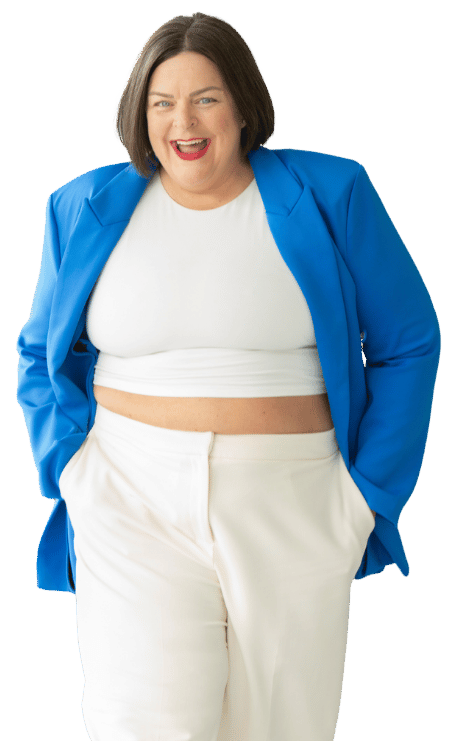
Welcome!
I’m Stephanie Dodier
I am a non-diet nutritionist, educator, and feminist business leader challenging everything we’ve been taught about food, health, and coaching.
I help health professionals confidently coach food and body without co-opting diet culture.
Join me in leading the health coaching revolution!
Ready? Let's do this!
FREE STARTER KIT & GUIDE
Let's start coaching client with confidence using the non-diet coaching approach!
Use this free intake forms kit and evaluate your client with food, body image and mindset and set the foundation for transformative coaching relationships, rooted in trust and client empowerment.


